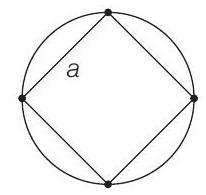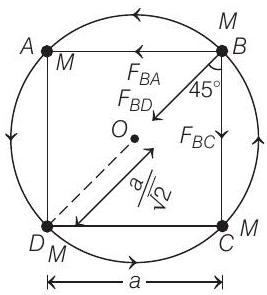Gravitation 5 Question 1
1. Four identical particles of mass
 circumscribing the square?
circumscribing the square?
(a)
(b)
(c)
(d)
(Main 2019, 8 April I)
Show Answer
Answer:
Correct Answer: 1. (b)
Solution:
- In given configuration of masses, net gravitational force provides the necessary centripetal force for rotation.

Net force on mass
[where, diagonal length
This force will act as centripetal force.
Distance of particle from centre of circle is
Here,
So, for rotation about the centre,






